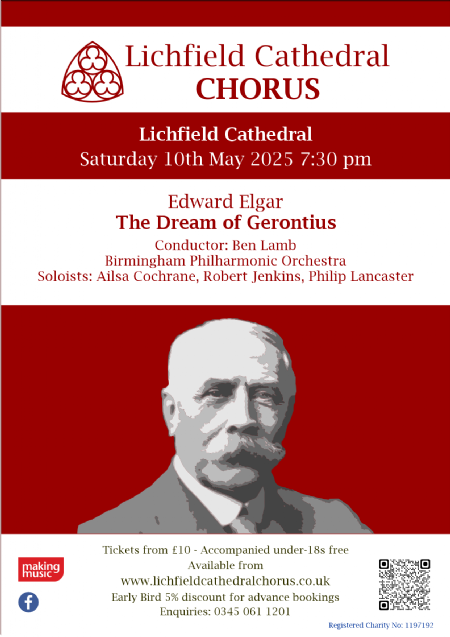The Dream of Gerontius - a review

By Zephan, Year 12
I am delighted to have been in the audience for the performance of Edward Elgar’s ‘The Dream of Gerontius’ recently at Lichfield Cathedral. Elgar’s Oratorio uses an edited version of the Catholic priest John Henry Newman’s poem ‘The Dream of Gerontius’. Newman’s poem tells the story of Gerontius, a dying Christian who fearfully awaits his death. Once deceased, Gerontius’ soul is guided by his Angel to receive judgment from God. This poem concludes as Gerontius is consigned to purgatory.
Theologically, the poem is interesting in its use of purgatory. It seems crazy to me that the piece was banned in many English Cathedrals until the 1930s because of this. I also think that, even after going to purgatory, the fact that Gerontius maintains his faith and is determined to improve himself is powerful. Edward Elgar builds on Newman’s poem with this powerful and musically rich Oratorio.
Vocally, the majority of the heavy lifting is done by the three soloists. Robert Jenkins excellently portrayed Gerontius. He effortlessly maintained his vocal stamina throughout the piece, which is impressive given the demands of his role. Jenkins’ projection was astonishing and his ability to seamlessly transition between modal voice and falsetto was breathtaking. I also greatly appreciated the fact that Jenkins really brought out the character of Gerontius - his worry and torment in Part 1 followed by his peace and resolution in Part 2. This characterisation added a level of nuance to his performance that I often think is lacking in classical singing.
Alisa Cochrane also does an excellent job as The Angel. Absent from Part 1, the addition of her voice in Part 2 was greatly uplifting, and it was a joy to hear her expression and vocal prowess reverberating in the Cathedral. The trio of vocalists was completed by Phillip Lancaster, who doubled up as both the Priest and the Angel of the Agony.
The Lichfield Cathedral Chorus appear as the Assistants in the first Part, and then the Choir of Angelicals, and also as Demons in the second Part. This choir is beautifully balanced, and in places, particularly whilst singing as the Choir of Angelicals, they created an ephemeral sound that was almost transcendent. I thought that some of the male basses were used exceptionally well as Demons to create a dark and foreboding mood. The Lichfield Cathedral Chorus was supported by Sarum Voices and the whole soundscape was underpinned by the wonderful Birmingham Philharmonic Orchestra, led by Julia Åberg. The piece begins with an orchestral prelude, establishing thematic elements returned to throughout. The Birmingham Philharmonic Orchestra played the orchestral prelude brilliantly, which includes a powerful crescendo that evoked a feeling of awe and majesty in me and really set the tone of the peace.
The orchestra was accompanied by the organist Liam Condon. While I struggled to pick out the organ above the orchestra, I am sure that he did a great job. We mustn’t of course forget Ben Lamb as the conductor, who held the entire operation together with passion.
The Dream of Gerontius was thoroughly enjoyable. As a student at Lichfield Cathedral School, to watch some of my teachers perform at such a high level was greatly inspiring. While I wouldn’t say that The Dream of Gerontius is my favourite piece of music in the world, it was a real pleasure to listen to this piece in such a beautiful venue as Lichfield Cathedral. I would greatly encourage anyone interested in Lichfield’s culture to support the Lichfield Cathedral Chorus’ upcoming performance of Mozart’s Requiem. I know I will be there!
Note: Ben Lamb, director; Ailsa Cochrane, soloist; Cathy Lamb, semi-chorus with Sarum Voices; and Eric Lunt, Acting Chair of Governors, sings with Lichfield Cathedral Chorus, alongside other members of the School community.














